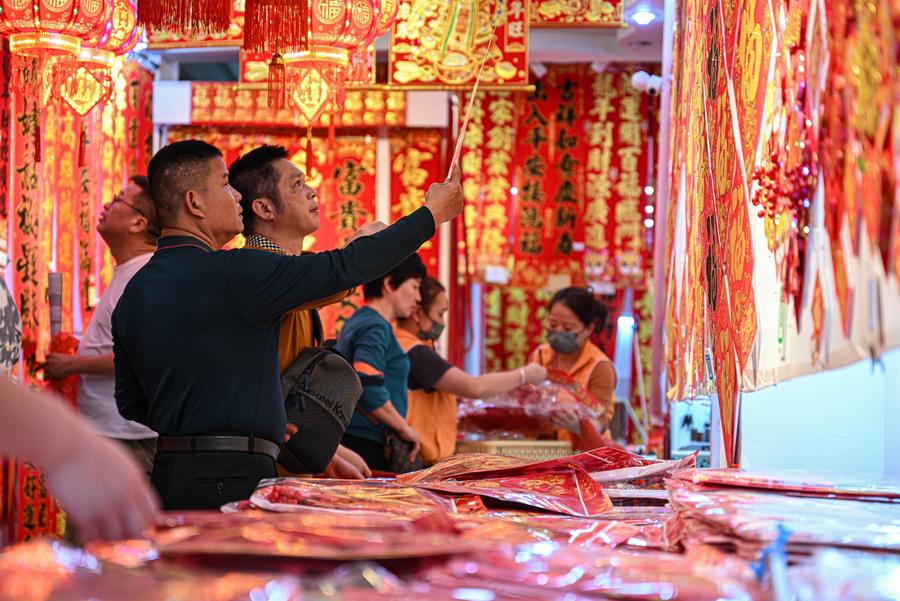

BEIJING - During the recent Spring Festival holiday, Hefei resident Yang Xiaoyan and her family enjoyed eating shrimp and crabs from the Jiangsu and Zhejiang provinces, sausages from Guangzhou, beef from Brazil, and lamb chops from New Zealand -- all at their own dinner table.
"Online shopping is very convenient, and you can have these different foods mailed to you," Yang said.
In recent years, Chinese people like Yang have embraced this adjustment to the tradition of stocking up on provisions for the Chinese Lunar New Year holiday, thanks to evolving digital technology and the country's efforts to promote online consumption.
During the monthlong 2024 national online Spring Festival shopping season, which ended on Feb. 17, China's online retail sales totaled 1.2 trillion yuan (about 168.86 billion U.S. dollars), with a daily average year-on-year increase of about 9 percent, He Yadong, a spokesperson for the Ministry of Commerce (MOC), said on Thursday.
As the first major online activity to boost consumption this year, the shopping season integrated the online promotional activities of various localities, e-commerce platforms and stores, and catered to consumer activities related to the Year of the Dragon, also known as the Year of the Loong.
China's e-commerce platforms have raced to profit on the shopping season since 2021 by preparing diverse commodities and activities to attract consumers.
Instant-retail platform Meituan Instashopping's sales of popular Chinese New Year gifts such as milk, cherries and baijiu, a Chinese spirit, hit record highs during the month, and sales of commodity categories such as home appliances, cosmetics and pet supplies grew at rates exceeding 100 percent, according to data from the platform.
Smart technology, environmentally friendly and health-related products were favored by consumers, as were products and services featuring elements of traditional Chinese culture.
According to data from Vipshop, a major online discount retailer in China, the sales volume of "China-chic" Year of the Dragon clothing increased 120 percent in the first week of the shopping season compared to the week before, and the sales volume of Year of the Dragon sweatshirts saw a more than threefold month-on-month surge.
Anhui, Shaanxi and Shanghai held online sales activities for time-honored brands to highlight the charm of trendy, China-made goods, and Zhejiang hosted activities such as an intangible cultural heritage Lunar New Year shopping festival, according to the MOC.
Home appliance retailer Suning's data shows that the customer flow at its stores nationwide has skyrocketed 206 percent year on year since the beginning of the monthlong event, and orders for its home appliance trade-in services have expanded 153 percent year on year.
The tradition of undertaking a thorough spring clean before the Spring Festival stimulated demand for related intelligent home appliances, with sales of robot vacuum cleaners, rotary floor scrubbers and smart window cleaning robots surging over 221 percent month on month, according to Suning.
Chinese people tend to attach increased importance to health during the traditional time for family reunions. Several e-commerce platforms monitored by the MOC saw their sales of cycling and skiing equipment increase by over 50 percent from the previous year, and sales of organic food at chain hypermarkets climbed approximately 20 percent year on year.
In county-level rural areas, sales of donkey-hide gelatin powder and fresh stewed cubilose saw threefold year-on-year increases, and sales of products such as glucose monitors and albumen powder increased by over 150 percent year on year, according to data from major e-commerce platforms, including JD. com.
China saw a robust revival of consumption during this year's Spring Festival, and the positive buying trend was a good start for online consumption in 2024, said Li Jiwei, deputy dean of the Meituan Research Institute.
The MOC will continue to hold online-consumption promotional activities with various themes, including the celebration of a good harvest and commodities along the Silk Road, as part of efforts to fulfill consumer demand in an improved manner, He said.